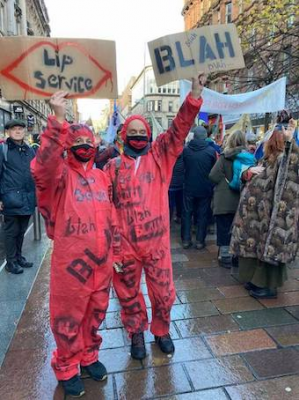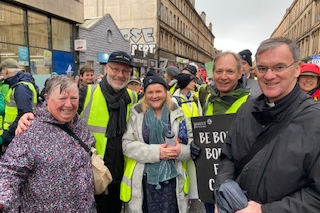COP26 Blog 5: Greenwash?

image: ICN/ET
Protests around COP26 disrupted Central Glasgow today. Frustration is palpable, with a gap being perceived between rhetoric from leading politicians and the urgent transition to a more sustainable society demanded by climate campaigners.
The term "greenwashing" was heard over and over again. This is an environmentalists' term for an organisation's false portrayal of itself as environmentally friendly. Some activists contend that corporations and many governments participating in the climate summit are guilty of just that, by paying lip service to combating climate change while continuing with business as usual.
In the days leading up to COP26 young climate activists slept overnight in London's Science Museum lamenting the establishment's sponsorship deals with fossil fuel companies. Around 30 members of the UK Student Climate Network camped in the museum's lobby after holding a candlelit vigil for "the victims of the museum's fossil fuel sponsors: Shell, BP, Equinor and Adani". The young people wanted "to reclaim this space from its destructive sponsors."
Despite the fact that greenhouse gas emissions need to drop sharply within the next few years, the world's governments continue to support the fossil-fuel industry with $11 million per minute, according to a new analysis from the International Monetary Fund. Yet, pressure is building up for this to change, not least from the growing divestment policy of faith groups.
Today at the summit the key theme was finance. Banks and asset managers representing 40 per cent of the world's financial assets, involving 450 firms across 45 countries, pledged to meet the goals set out in the Paris climate agreement. Yet, responding to chancellor Rishi Sunak's "finance day" speech, Christian Aid's Jennifer Larbie said: "this announcement does little to shift the dial now on the trillions still flowing into fossil fuel projects every day, with the deadliest of impacts borne by developing countries."
Yeb Sano, a well-known environmental activist from the Philippines, said in a tweet today, to "beware of those supporting carbon markets, especially offsets, as a solution to the climate crisis." He felt, "they don't grasp the true transformation required to fulfil the Paris goals." Carbon credits could, for example, be generated by planting trees or buying up existing forests, as a way to "offset" a dirty power project on the other side of the world or further oil development, such as Total in the Democratic Republic of the Congo.
There was another contentious area revealed yesterday as leaders of more than 100 countries vowed to end deforestation by 2030. Frontline communities want action well before that! But will world leaders stick to the promise made? Regarding Brazil, it is expected that President Jair Bolsonaro 's motivation comes more from his desire to claw back public support than to save the rainforest. Deforestation of the Brazilian Amazon has soared since he took office in 2019. The Bolsonaro administration slashed funding to Brazil's environmental agency, accused environmental NGOs of starting fires, and sacked the head of Brazil's National Institute for Space Research when it released an unflattering report on deforestation. Not much sign then that the president has had an "ecological conversion".
An important meeting today was a side event , 'Making Peace with Nature: Heeding the Call of Indigenous Peoples', co-organised by the Anglican Communion, Religions for Peace International, the World Council of Churches and others. The Churches have long called for the world to listen to indigenous peoples who have been raising their voices outside the conference centre today. They want serious green action, not greenwash.
This morning I was invited to meet Green Christian members at Govan and Lyndhurst parish church near the exhibition centre, where they are holding daily talks and prayers during the summit. It was a small group but an impressive one. There was Euan McPhee who has cycled from Cornwall to Glasgow, stopping in each Anglican diocese he passed through to pick up their climate declarations for handing to the COP organisers. These dioceses included Truro, Exeter, Wells, Bristol, Lichfield and Liverpool.
Also present was Sr Mary Jo McElroy, who is on the international Justice and Peace team of the Religious of the Sacred Heart of Mary. She lives in Noddfa, a retreat house in Penmaenmawr, North Wales, but before that spent 20 years in North East Brazil. She spoke of her background working there and witnessing the impacts of worsening desertification, the murder of justice and environment activists, and the inspiration of the Church's Basic Christian Communities. Outside the conference venue is a sign providing a powerful reminder of the 1000 plus environmental defenders killed since the Paris agreement. No wonder passions are raised!
I admire peaceful protest to add to the momentum for action, but also feel we must give this summit a chance to deliver. We know it must deliver. The United Nations COP process is the best hope for progress on the global scale.


















